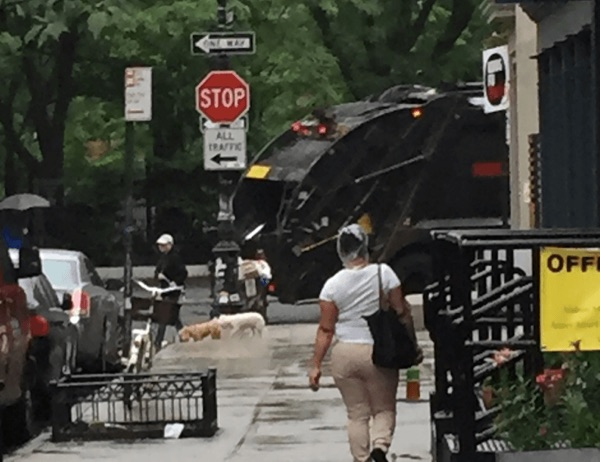In the 1999 study "Killed by Automobile" [PDF], researcher Charles Komanoff found that operators of private trash trucks killed more pedestrians per mile driven than any other type of vehicle in NYC. With two such deaths in the last three months, there’s more urgency to implement City Hall’s proposed reforms to bring order to waste collection routes and reduce private carter mileage on city streets.
Last weekend a private trash hauler struck and killed cyclist Neftaly Ramirez in Greenpoint, then fled the scene. The driver has not been identified, but NYPD told DNAinfo the truck belongs to Action Carting.
Ramirez's death occurred two months after a driver for M&M Sanitation killed 60-year-old Fern Jones in Greenwich Village.
The city does not publish data on crashes that involve private trash trucks, but a 2016 city-commissioned study conducted by Sam Schwartz Engineering found that of 21 reported crashes between 2010 and 2014, 86 percent resulted in injury or death. The study also indicated that such crashes are likely underreported. According to crash data tracked by Streetsblog, private trash haulers have killed at least 13 people in NYC since 2012.
Private sanitation companies, which collect commercial waste, are contracted by individual clients. With clients spread across the city, routes are long and circuitous, and companies are known to cut corners, putting the public, and their employees, at risk.
From a 2016 Politico piece on industry working conditions:
In one night, some 20 trucks from different companies could visit a single city block, bringing with them all the concomitant emissions, traffic and safety concerns.
Last year, City Hall announced a plan to institute zone-based waste collection, which could reduce private carting mileage by 49 to 68 percent, or up to 15.64 million miles a year. It's estimated that the plan would cut greenhouse gas emissions, and emissions that cause respiratory illness, by up to 64 percent in each category.
"The current system is just a mess," says Eddie Bautista, executive director of the NYC Environmental Justice Alliance, a long-time proponent of waste carting reforms.
Private trash haulers are not required to install safety devices like cameras or GPS on their trucks, and drivers -- who, unlike city sanitation workers, usually aren't unionized and are more vulnerable to being exploited -- might go multiple shifts without a break, since there's no cap on the number of hours they may work. "Nobody's monitoring it," says Bautista. "Nobody cares."
Bautista says the de Blasio administration is so far adhering to its two-year timeline for developing a reform package. The Sanitation Department recently awarded a contract to consultants for a plan that should eventually serve as the basis for legislation.
"If done right, commercial zoning addresses multiple flaws in the system virtually simultaneously," Bautista says. While it will be some time before a reform proposal is on the table, he says, "Right now we're satisfied that the city is taking this seriously."
Streetsblog asked City Council Member Antonio Reynoso, who chairs the sanitation committee, whether a company's traffic safety record affects its ability to operate in the city. A Reynoso spokesperson referred us to the Business Integrity Commission, which regulates the commercial waste industry.
The commission conducts traffic safety sessions for licensees, but Reynoso would like more oversight. His office is working on a bill “that would prevent drivers with suspended licenses or a proven record of persistent reckless driving from driving for BIC-licensed companies,” the spokesperson said.
We have a message in with BIC concerning what, if any, penalties exist for companies with poor traffic safety records.






